
The Alpha and the Omega
The identity of “The Alpha and the Omega” of the book of Revelation is quite often the source of debate, and this is usually between those who subscribe to the doctrine of the trinity versus those who believe what the Bible teaches, namely, that the Almighty God of the Bible and his son, Jesus Christ, are in fact, two separate individuals. The fact that Jesus Christ is the second highest ranking individual, and not the Most High God, is clearly depicted in the vision of Revelation. Within John’s vision, there is a unique title that is used, “The Alpha and the Omega”, and the purpose of this article is to take a simple approach at identifying who that title belongs to.
With any story, identifying the main characters comes early on in a book. In Charlotte’s Web, we quickly learn who Wilbur, Charlotte, and the Zuckerman’s are. In Genesis, on the second or third page, we become acquainted with the names, Jehovah, Adam, and Eve. In Revelation, we see something similar in the greetings expressed in the fourth verse of the first chaper:
“May you have undeserved kindness and peace from “The One who is and who was and who is coming,” and from the seven spirits that are before his throne, and from Jesus Christ, “the Faithful Witness,” “The firstborn from the dead,” and “The Ruler of the kings of the earth.” Revelation 1:4-5
So here in this verse, right away we are introduced to three characters, namely, 1) The One who is and who was and who is coming, 2) the seven spirits that are before #1’s throne, and 3) from Jesus Christ. Let’s use an illustration:
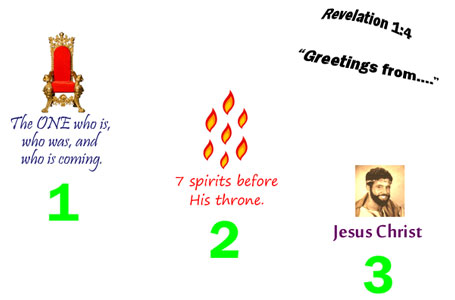
Revelation 1:4-5
Right away we learn in Revelation 1:4-5 that “The One who is and who was and who is coming” sits upon a throne. This will be significant as we move along.
In verse 8, we come across our first use of the title “The Alpha and the Omega”:
“I am the Al′pha and the O‧me′ga,” says Jehovah God, “the One who is and who was and who is coming, the Almighty.” Revelation 1:8
So did you catch that? Of the three characters we have just been introduced to, which of them has told us upfront and right away that HE is the Alpha and the Omega? Yes, it was “The One who is and who was and who is coming”.
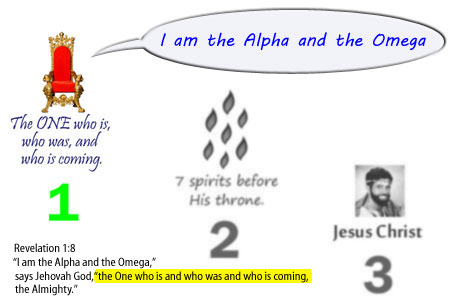
Revelation 1:8
So the Most High God, Jehovah, identifies himself as the Alpha and the Omega, and not the other 3 characters who are on the scene at this point. This title harmonizes with other titles he uses in this same sentence. “The One who is and who was and who is coming” should bring to mind his being eternal, with no end and no beginning, which is only true of Jehovah because all other things, including Jesus, had a beginning (Psalm 90:2, Proverbs 8:22, Micah 5:2, Colossians 1:15, Revelation 3:14).
Now, characters in a book are constant features. Once their identities are established, we know who they are and when they are speaking throughout the rest of the story. Likewise, at these point, this characters identity has been clearly established, and we could be satisfied at this point as we read along the rest of this vision of John. But in harmony with the principle “that at the mouth of two or three witnesses every matter may be established”, let’s try to confirm the identity of the Alpha and the Omega again in the next instance it occurs (Matthew 18:16).
While maybe John alone had heard this first exclamation, and untold number of people were present when these words were uttered again. But before we skip to that part, let’s take a moment to analyze the scene. Take a look at these scriptures and this illustration:
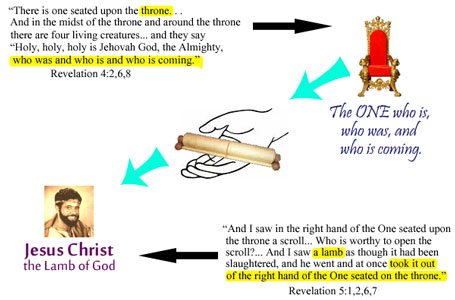
Revelation chapters 4 & 5
After addresses some congregations in the first 3 chapters, the vision moves into the heavens in chapter four. There we see the throne again, and the one seated on it is “The One who is and who was and who is coming”, whom we have already learned to be the Almighty God, Jehovah, the Father. He is holding a scroll in His right hand and the question arises “Who can open it?” The answer is “The Lion of the tribe of Judah”, and “The Lamb of God” which are both titles of Jesus Christ. Jesus is not “The One who is and who was and who is coming” and is not the one seated on the throne. Jesus approaches the one who earlier identified himself as the Alpha and the Omega and takes the scroll from His hand.
Now let’s move forward to the next time the title Alpha and Omega occurs:
“And the One seated on the throne said: “Look! I am making all things new.” Also, he says: “Write, because these words are faithful and true.” And he said to me: “They have come to pass! I am the Al′pha and the O‧me′ga, the beginning and the end. To anyone thirsting I will give from the fountain of the water of life free. Anyone conquering will inherit these things, and I shall be his God and he will be my son.” Revelation 21:5-7
Did you notice who identified Himself again as “The Alpha and the Omega”?

Revelation 21:6
Yes, it was the “One seated on the throne” and not Jesus Christ. Also significant in this verse is that He says “I shall be his God, and he will be my son”. While God often refers to individuals as his sons, Jesus never refers to others as his ‘sons’ but rather as his ‘brothers’.
So, we have these characters in John’s vision, in Revelation, who have been clearly identified for us. On the one hand, we have the Almighty God who refers to himself as the Alpha and the Omega, and on the other hand, we have Jesus Christ, who has been in his presence each time and has said nothing to the contrary.
Our final reading of the phrase comes in the last chapter of the book:
“‘Look! I am coming quickly, and the reward I give is with me, to render to each one as his work is. I am the Al′pha and the O‧me′ga, the first and the last, the beginning and the end. Happy are those who wash their robes, that the authority [to go] to the trees of life may be theirs and that they may gain entrance into the city by its gates. Outside are the dogs and those who practice spiritism and the fornicators and the murderers and the idolaters and everyone liking and carrying on a lie.’” Revelation 22:12-15
So, who is speaking here? Well, it is none other than the Alpha and the Omega! We learned who this was in chapter one, and his identity has been made clear throughout the vision. This is the Almighty God, Jehovah.
However, the trinitarian will just downright insist that on this last occurrence, it is Jesus himself speaking and claiming to be the Alpha and the Omega. This is because one of their common tactics is to refer to titles that can appropriately apply to either the Father or the Son in order to cloud the distinction between them in their efforts to convince you that they are not two, but “one”. To persuade you to believe that Jesus too calls himself the Alpha and the Omega would be a powerful argument if it were true, and while some trinitarians would claim that in all these instances it was Jesus speaking all along, in this instance they try to capitalize on the next verse:
“I, Jesus, sent my angel to bear witness to you people of these things for the congregations.. . .” Revelation 22:16
But does Jesus speaking here mean that he was also speaking the words right before? No. Not at all. Jesus is clearly identifying himself in verse 16, just as the Alpha and the Omega had identified Himself in the preceeding statements as well as on two other occasions in the book of Revelation. In this last chapter, several people are speaking, 1) the Angel, 2) the Alpha and the Omega, 3) Jesus, and 4) John.
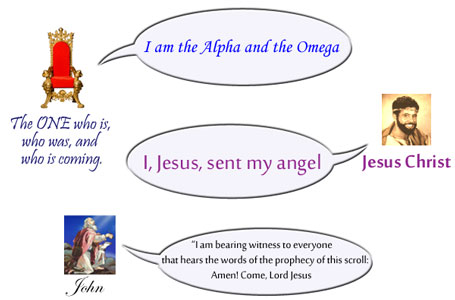
Revelation 22
Consider what the Alpha and the Omega said in verse 12, “and the reward I give is with me, to render to each one as his work is” and what is said about Almighty God in these other parts of the Bible:
“Also loving-kindness belongs to you, O Jehovah, For you yourself pay back to each one according to his work.” Psalm 62:12
“Do you have this idea… that you will escape the judgment of God? … Do you not know that the kindly quality of God is trying to lead you to repentance?… He will render to each one according to his works… For there is no partiality with God.” Romans 2:3-11
Lastly, does it make sense that this person’s identity, which was clearly established at the beginning of this book and throughout, suddenly become clouded at the end of the book in it’s very last chapter, in it’s epilogue after the vision has been given and the story already told? Of course not.
Put yourself in John’s position. When John received that vision, he could clearly see with his own eyes “the One who is and who was and who is coming” sitting on his throne and twice calling himself the Alpha and the Omega, and he could also clearly see that Jesus Christ was a separate individual in the vision who did not call himself by such a title, but rather received a scroll, direction, and orders from the one calling Himself the Alpha and the Omega. So at the end of this vision, when the angel relays this persons words who says for a third time that he is the Alpha and the Omega, doesn’t John already know by now who this person is? Would John really wonder at this point who is speaking? No he would not!
Rather than inserting interpretations or preconceived ideas into any Bible text, we are wise to simply read what it actually says. Granted, there are certain elements of the vision of Revelation that can be quite challenging to figure out on one’s own. However, the identity of “the Alpha and the Omega” is not one of them, and is abundantly clear that only the Almighty God, the Father, ever refers to Himself with such a title.

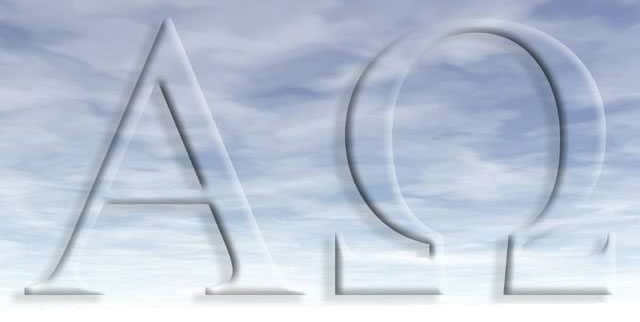
Interesting and well displayed.
Very well done!
Very good explanation, Christendom using the title Lord for Jesus & Jehovah is the big problem in their mixed up understanding
You’re right! If they would just leave the name Jehovah where it belongs, instead of tampering with the scriptures and removing his name and replacing it with LORD, a lot of misunderstanding could be avoided.